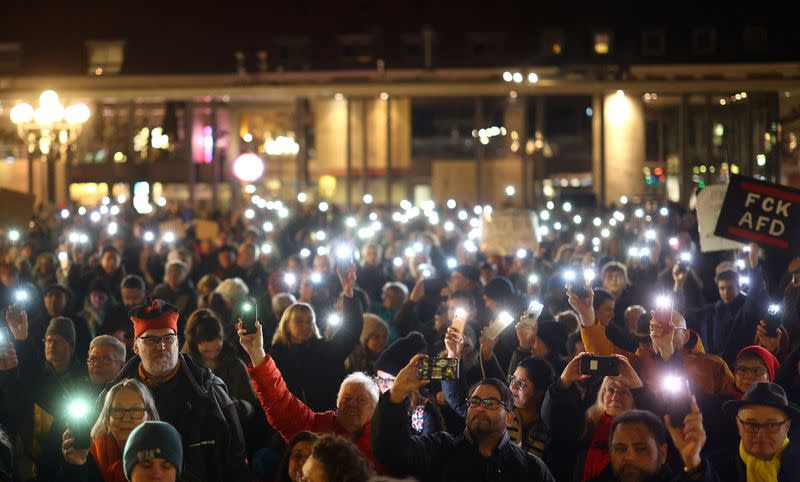Analysis-Ban the AfD or fight it? Germany grapples over how to counter the far-right

- Oops!Something went wrong.Please try again later.
By Andreas Rinke and Sarah Marsh
BERLIN (Reuters) - This month German Chancellor Olaf Scholz marshalled his ministers to discuss for two hours straight strategies on how best to tackle the far-right Alternative for Germany (AfD), which is polling in second place nationwide.
The AfD's success has become an urgent concern for all mainstream parties in Germany amid fears that it could sweep communal and European elections in June and three state elections in eastern Germany in September.
Once dismissed as a fringe movement, the 11-year-old anti-establishment party has about 20% support nationwide, behind only the main opposition conservatives, polls suggest. It places first in Thuringia, Saxony and Brandenburg in eastern Germany.
Underscoring how Berlin's thinking has changed, the ministers at Scholz's meeting acknowledged that public infighting within their unwieldy three-way coalition had contributed to the rise of the AfD, a government source said.
"We recognised we have to convey better the fact that the coalition actually does work," the source said.
But it's not just the cabinet. Strategies to fight the AfD have dominated discussions at meetings of all mainstream parties. Options have ranged from a ban on the AfD to the suspension of state financing and legal measures to prevent the most extremist politicians from standing for office.
"We once again have a right-wing extremist party ... that wants to destroy our free, democratic basic order, and that we have not managed to politically constrain in the last 10 years," conservative lawmaker Marco Wanderwitz, who is leading the push for a ban, told Reuters.
"Instead it is getting bigger."
Another strategy gaining traction is for all mainstream parties to club together against the AfD, for example all backing a single candidate in elections - something they have already done successfully at communal level.
NO CONSENSUS
But there is no consensus so far either within the parties or across the political spectrum on the best strategy.
Scholz, whose Social Democrats are in coalition with the Greens and the liberal Free Democrats (FDP), appears to have changed his tone. Having earlier sounded dismissive of the AfD, the chancellor has in a rare act of public contrition acknowledged missteps by the coalition.
His government has also taken a tougher line on some migration issues and passed legislation this month to facilitate the deportation of migrants without a legal right to asylum.
On Wednesday Scholz evoked the Nazi past to urge Germans to fight extremism together and see the AfD for what it is.
"Those who remain silent are complicit," he said.
The AfD says it is the victim of a state-backed campaign.
"What's happening here is a huge scandal: a government with nothing to offer politically is now resorting out of despair and fear of the AfD's looming electoral successes to the most disgraceful measures," Hans-Christoph Berndt, the party's leader in the parliament of Brandenburg, told reporters.
A landmark court ruling this month allowing public funding to the radical right-wing party Die Heimat to be cut on grounds of being anti-constitutional has fuelled a debate on whether a similar step could be taken against the AfD.
The AfD is under state surveillance on suspicion of being anti-constitutional.
In Thuringia, a court determined local party chief Bjoern Hoecke could be described as a fascist. More than one million people have signed a petition calling for him to lose his right to stand for election, in what would be an unprecedented legal procedure.
But many politicians are cautious about such legal options, saying they face high hurdles, could take years and ultimately backfire.
"We have to avoid conferring (on the AfD) martyr status and rather fight it politically with arguments," Sven Schulze, head of the conservatives in Saxony-Anhalt, told the Sueddeutsche Zeitung.
Hoecke is already making hay with the petition against him.
"This is not democracy anymore. This is semi-totalitarianism we live in," he said in a video on Facebook.
POLICIES IN FOCUS
The idea of all parties uniting against the AfD also risks bolstering the party by allowing it to argue that there is no real difference between the mainstream parties and cast itself as the only genuine alternative, critics say.
The one strategy all mainstream parties seem to agree on is highlighting the actual policies of the AfD, which is anti-EU, anti-immigrant and disputes that human activity is a cause of climate change.
"We have to force the AfD into campaign mode by showing people they are a danger for Germany and Europe," Marie-Agnes Strack-Zimmermann, the FDP's lead candidate for the European Parliament elections, told Reuters.
Many politicians highlighted a report this month about discussions between AfD politicians and right-wing radicals about mass deportations of citizens of foreign origins.
The AfD has said such plans are not party policy. But the proposals evoked dark memories of the Nazis' initial plan to deport European Jews to Madagascar, prompting hundreds of thousands to take to the streets in protest.
Such protests may have had some effect: a poll on Tuesday showed the AfD dropping below 20% for the first time since July.
(Reporting by Sarah Marsh and Andreas Rinke; Additional Reporting by Alexander Ratz and Thomas Escritt; editing by Matthias Williams and Gareth Jones)

